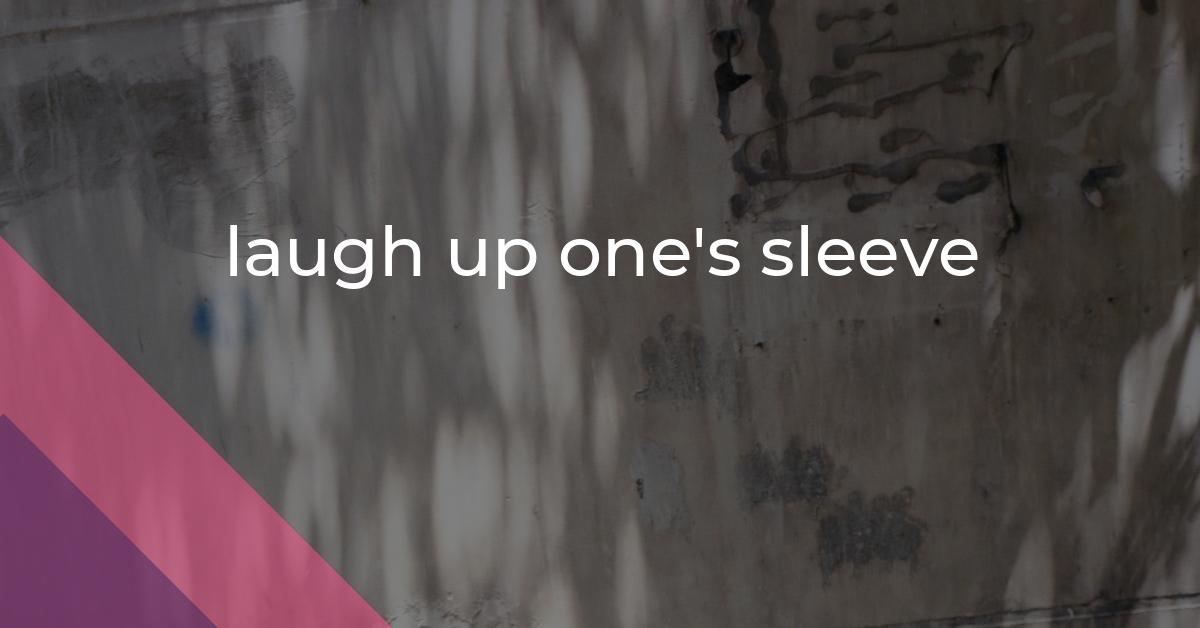laugh up one’s sleeve: Idiom Meaning and Origin
What does ‘laugh up one's sleeve’ mean?
The idiom *laugh up one's sleeve* means to secretly find amusement or satisfaction in a situation without showing it openly. It implies a hidden or sly sense of humor.

Idiom Explorer
The idiom "laugh one's head off" means to laugh uncontrollably and excessively.
The idiom "laugh in one's sleeve" means to secretly or quietly find something amusing or funny without showing it openly.
The idiom "laugh a minute" refers to someone or something that is consistently funny or amusing, providing frequent moments of laughter.
The idiom "laugh all the way to the bank" means to feel a sense of satisfaction or joy when you have made a lot of money or have been successful in financial matters.
The idiom "lap up" means to enthusiastically accept or enjoy something, often without much thought or consideration. It is similar to eagerly drinking up or accepting something without hesitation.
The idiom "kick up one's heels" means to relax, have fun, or engage in lively enjoyment and uninhibited behavior.
The idiom "keep one's cards close to one's chest" means to keep one's thoughts, plans, or intentions secret or hidden in order to maintain an advantage or not reveal too much information.
The idiom "in one's back pocket" means to have complete control or influence over someone or something.
The idiom "hold onto your hat" means to prepare oneself for something surprising or exciting that is about to happen. It is often used to indicate that someone should be ready for a fast or unpredictable experience.
Sneaky Grins
The idiom "laugh up one's sleeve" has a long history in the English language. It is used to describe a situation where someone is secretly amused or taking pleasure in the misfortune of others, but is disguising their amusement. The origins of this idiom can be traced back to the medieval times when long sleeves were a sign of wealth and luxury.
One interesting fact about this idiom is that it comes from the practice of hiding laughter or amusement by raising one's sleeve to cover their mouth. This gesture was common among the upper class in the past, as they didn't want to openly display their amusement at the expense of others. By laughing up one's sleeve, they could maintain a sense of decorum and social etiquette.
Another related idiom is "laugh in one's sleeve." This phrase is used to describe someone who is secretly laughing or taking pleasure in someone else's misfortune. While "laugh up one's sleeve" emphasizes the act of raising the sleeve to hide laughter, "laugh in one's sleeve" focuses more on the actual act of laughing.
The idiom "ace up one's sleeve" is also related to "laugh up one's sleeve." "Ace up one's sleeve" is often used to describe someone who has a secret plan or strategy, as if they are hiding it up their sleeve. In the case of "laugh up one's sleeve," the phrase is used metaphorically to describe the hidden amusement someone feels.
It is possible that the idiom "laugh up one's sleeve" was influenced by the tradition of jesters and court fools during medieval times. These entertainers were often tasked with making fun of the nobility and their follies, but they had to do so in a subtle way to avoid punishment. They would laugh up their sleeves, figuratively speaking, to avoid drawing attention to their amusement.
Today, the idiom "laugh up one's sleeve" continues to be widely used in English-speaking countries. It adds color and expressiveness to storytelling and literature, allowing writers to convey the feeling of secret amusement or taking pleasure in someone else's misfortune.
The idiom "laugh up one's sleeve" has its roots in the practices and customs of the past. Its imagery of hiding laughter behind a sleeve has resonated with English speakers for centuries. While the exact origins of this idiom may not be known, its usage and meaning have remained consistent. It serves as a reminder that humans have always found ways to express and conceal their true emotions, even in the face of adversity.
Example usage
Examples of how the idiom *laugh up one's sleeve* can be used in a sentence:
1. He pretended to sympathize with his friend's misfortune, but deep down he was laughing up his sleeve.
2. The politician's opponent stumbled during the debate and the audience couldn't help but laugh up their sleeves.
3. Sarah didn't want to show her excitement when she won the lottery, so she quietly laughed up her sleeve.
More "Deception" idioms



